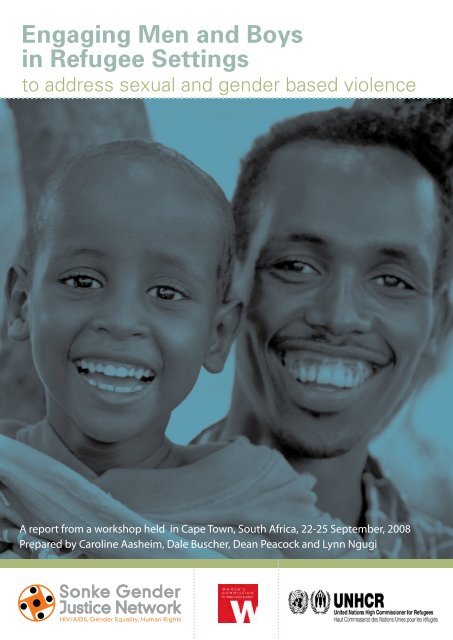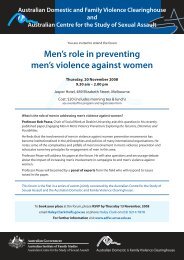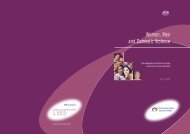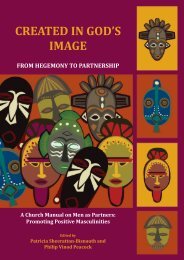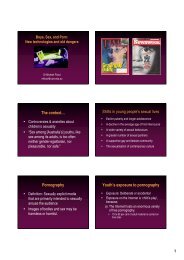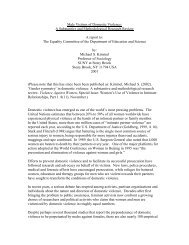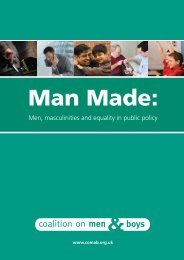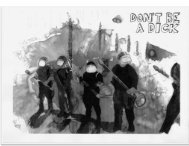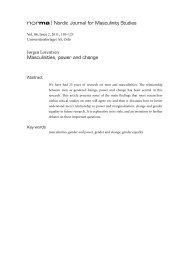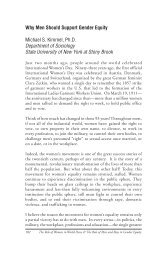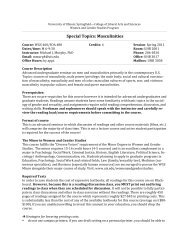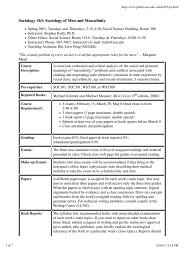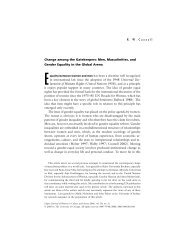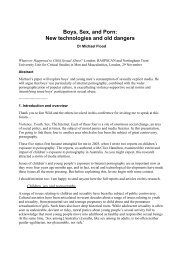Engaging Men and Boys in Refugee Settings - Women's Refugee ...
Engaging Men and Boys in Refugee Settings - Women's Refugee ...
Engaging Men and Boys in Refugee Settings - Women's Refugee ...
Create successful ePaper yourself
Turn your PDF publications into a flip-book with our unique Google optimized e-Paper software.
<strong>Engag<strong>in</strong>g</strong> <strong>Men</strong> <strong>and</strong> <strong>Boys</strong><br />
<strong>in</strong> <strong>Refugee</strong> Sett<strong>in</strong>gs<br />
to address sexual <strong>and</strong> gender based violence<br />
A report from a workshop held <strong>in</strong> Cape Town, South Africa, 22-25 September, 2008<br />
Prepared by Carol<strong>in</strong>e Aasheim, Dale Buscher, Dean Peacock <strong>and</strong> Lynn Ngugi<br />
Sonke Gender<br />
Justice Network
2<br />
<strong>Engag<strong>in</strong>g</strong> <strong>Men</strong> <strong>in</strong> <strong>Refugee</strong> Sett<strong>in</strong>gs
Context<br />
Work<strong>in</strong>g with men <strong>in</strong> refugee sett<strong>in</strong>gs<br />
<strong>Engag<strong>in</strong>g</strong> men <strong>and</strong> boys has emerged as a vital strategy for end<strong>in</strong>g gender based violence,<br />
<strong>in</strong>clud<strong>in</strong>g <strong>in</strong> refugee <strong>and</strong> post-conflict sett<strong>in</strong>gs. While prevention <strong>and</strong> response activities are<br />
essential, the humanitarian community <strong>and</strong> host country service providers underst<strong>and</strong> that<br />
they must move beyond simply address<strong>in</strong>g each <strong>in</strong>dividual case of sexual <strong>and</strong> gender-based<br />
violence (SGBV) <strong>and</strong> beg<strong>in</strong> to address the societal, cultural, economic, religious <strong>and</strong> political<br />
systems that either perpetuate or allow for violence based on gender to cont<strong>in</strong>ue. This requires<br />
attitud<strong>in</strong>al change, systems change <strong>and</strong> behavioral change – largely on the part of men <strong>and</strong><br />
boys who cont<strong>in</strong>ue to be the vast majority of perpetrators. <strong>Men</strong> <strong>and</strong> boys have to be engaged<br />
to build underst<strong>and</strong><strong>in</strong>g that it is their actions <strong>and</strong> their attitudes that cont<strong>in</strong>ue to put women<br />
<strong>and</strong> girls at-risk <strong>and</strong> they have to be engaged to put a stop to it.<br />
Recent research suggests that carefully designed policies <strong>and</strong> <strong>in</strong>terventions can br<strong>in</strong>g about<br />
changes that improve men’s <strong>and</strong> women’s health or men’s gender-related attitudes <strong>and</strong><br />
behaviours, <strong>and</strong> that they can achieve this change <strong>in</strong> relatively short time periods. The Medical<br />
Research Council’s evaluation of the Stepp<strong>in</strong>g Stones <strong>in</strong>itiative implemented <strong>in</strong> the Eastern Cape<br />
showed significant changes <strong>in</strong> men’s attitudes <strong>and</strong> practices. With two years follow up, men who<br />
participated <strong>in</strong> the <strong>in</strong>tervention reported fewer partners, higher condom use, less transactional<br />
sex, less substance abuse <strong>and</strong> less perpetration of <strong>in</strong>timate partner violence. 1,2 In Brazil, Instituto<br />
Promundo’s <strong>in</strong>tervention with young men on promot<strong>in</strong>g healthy relationships <strong>and</strong> HIV/STI<br />
prevention, showed significant shifts <strong>in</strong> gender norms at six months <strong>and</strong> twelve months. Young<br />
men with more equitable norms were between four <strong>and</strong> eight times less likely to report STI<br />
symptoms with additional improvements at 12 months post <strong>in</strong>tervention. 3 Follow<strong>in</strong>g upon<br />
these f<strong>in</strong>d<strong>in</strong>gs, the World Health Organisation recently released a report endors<strong>in</strong>g the efficacy<br />
of work<strong>in</strong>g with men to achieve gender equality <strong>and</strong> describ<strong>in</strong>g the key aspects of successful<br />
<strong>in</strong>terventions (summarized <strong>in</strong> Annex One) 4<br />
This emerg<strong>in</strong>g field of work with men <strong>and</strong> the grow<strong>in</strong>g evidence base that accompanies it is<br />
<strong>in</strong>creas<strong>in</strong>gly recognized <strong>in</strong> <strong>in</strong>ternational commitments <strong>and</strong> declarations <strong>in</strong> which governments<br />
have committed to work with men for gender equality. The key <strong>in</strong>ternational commitments are<br />
as follows:<br />
The 1994 International Conference on Population <strong>and</strong> Development affirmed the need<br />
to “promote gender equality <strong>in</strong> all spheres of life, <strong>in</strong>clud<strong>in</strong>g family <strong>and</strong> community life, <strong>and</strong> to<br />
encourage <strong>and</strong> enable men to take responsibility for their sexual <strong>and</strong> reproductive behavior <strong>and</strong><br />
their social <strong>and</strong> family roles.” 5<br />
The Programme of Action of the World Summit on Social Development (1995) <strong>and</strong> its<br />
review held <strong>in</strong> 2000 also addressed the role of men <strong>and</strong> paid particular attention to men’s roles<br />
<strong>and</strong> responsibilities with regards to shar<strong>in</strong>g family, household <strong>and</strong> employment responsibilities<br />
with women. 6<br />
The Beij<strong>in</strong>g Platform for Action (1995) restated the pr<strong>in</strong>ciple of shared responsibility; <strong>and</strong><br />
argued that women’s concerns could only be addressed “<strong>in</strong> partnership with men”. 7<br />
The twenty-sixth special session of the General Assembly on HIV/AIDS (2001)<br />
recognized the need to challenge gender stereotypes <strong>and</strong> attitudes <strong>and</strong> gender <strong>in</strong>equalities<br />
<strong>in</strong> relation to HIV/AIDS through the active <strong>in</strong>volvement of men <strong>and</strong> boys. This addressed men’s<br />
roles <strong>and</strong> responsibilities related to reduc<strong>in</strong>g the spread <strong>and</strong> impact of HIV <strong>and</strong> AIDS, especially<br />
the need to engage men <strong>in</strong> challeng<strong>in</strong>g the gender <strong>in</strong>equalities driv<strong>in</strong>g the epidemic. 8<br />
<strong>Engag<strong>in</strong>g</strong> <strong>Men</strong> <strong>in</strong> <strong>Refugee</strong> Sett<strong>in</strong>gs 3
The United Nations Commission on the Status of Women (CSW), at its 48 th session <strong>in</strong><br />
2004, adopted agreed conclusions call<strong>in</strong>g on Governments, entities of the United Nations<br />
system <strong>and</strong> other stakeholders to, <strong>in</strong>ter alia:<br />
• Encourage the active <strong>in</strong>volvement of men <strong>and</strong> boys <strong>in</strong> elim<strong>in</strong>at<strong>in</strong>g gender stereotypes;<br />
• Encourage men to participate <strong>in</strong> prevent<strong>in</strong>g <strong>and</strong> treat<strong>in</strong>g HIV/AIDS;<br />
• Implement programmes to enable men to adopt safe <strong>and</strong> responsible sexual practices;<br />
• Support men <strong>and</strong> boys to prevent gender-based violence;<br />
• Implement programmes <strong>in</strong> schools to accelerate gender equality;<br />
• Promote reconciliation of work <strong>and</strong> family responsibilities.<br />
Thus, there is evidence that program <strong>and</strong> policy <strong>in</strong>terventions can br<strong>in</strong>g about positive change<br />
among men, <strong>and</strong> there is an <strong>in</strong>ternational m<strong>and</strong>ate for policy <strong>and</strong> programm<strong>in</strong>g address<strong>in</strong>g<br />
men. However, so far most programs have been small <strong>in</strong> scale, have limited if any susta<strong>in</strong>ability<br />
<strong>and</strong> have not, with a few notable exceptions, been taken up or scaled up at the policy level.<br />
Indeed, the emerg<strong>in</strong>g f<strong>in</strong>d<strong>in</strong>gs of the WHO <strong>and</strong> Promundo study po<strong>in</strong>t to the fact that men can<br />
<strong>and</strong> have changed as a result of program <strong>in</strong>terventions, but that our program efforts have been<br />
timid <strong>and</strong> small <strong>in</strong> scale <strong>and</strong> have not reflected on how to take such potential for change to a<br />
larger scale. While this is not surpris<strong>in</strong>g, few program coord<strong>in</strong>ators <strong>and</strong> staff engaged <strong>in</strong> such<br />
programs are th<strong>in</strong>k<strong>in</strong>g beyond small-scale public health <strong>in</strong>terventions to the large scale of policy<br />
levers <strong>and</strong> <strong>in</strong>itiatives that lead to larger, faster <strong>and</strong> broader change <strong>in</strong> men’s behaviors related<br />
to sexual <strong>and</strong> reproductive health. To truly transform gender <strong>in</strong>equalities, we must go beyond<br />
scattered, small-scale <strong>in</strong>terventions <strong>and</strong> efforts (no matter how effective), towards systematic,<br />
large-scale, <strong>and</strong> coord<strong>in</strong>ated efforts.<br />
4<br />
<strong>Engag<strong>in</strong>g</strong> <strong>Men</strong> <strong>in</strong> <strong>Refugee</strong> Sett<strong>in</strong>gs
UNHCR <strong>and</strong><br />
work with men<br />
<strong>Engag<strong>in</strong>g</strong> <strong>Men</strong> <strong>in</strong> <strong>Refugee</strong> Sett<strong>in</strong>gs 5
UNHCR has recognized the essential role that both male staff <strong>and</strong> male persons of concern play<br />
<strong>in</strong> end<strong>in</strong>g gender-based violence <strong>in</strong> its operations <strong>and</strong> that protect<strong>in</strong>g women from SGBV is part<br />
of the organization’s core protection m<strong>and</strong>ate. This workshop was organized to raise awareness<br />
of the need to engage men <strong>and</strong> boys, to look at successful models for such engagement, <strong>and</strong><br />
to develop country-level strategies for strengthen<strong>in</strong>g the engagement of men <strong>and</strong> boys to end<br />
sexual <strong>and</strong> gender-based violence.<br />
The workshop addressed knowledge, attitudes <strong>and</strong> action <strong>and</strong> brought together UNHCR <strong>and</strong><br />
implement<strong>in</strong>g partner staff as well as refugees from ten African countries <strong>in</strong>clud<strong>in</strong>g gender<br />
practitioners <strong>and</strong> organizations already engaged <strong>in</strong> work<strong>in</strong>g with men <strong>and</strong> boys.<br />
Workshop Summary<br />
A four day regional workshop was facilitated by Sonke Gender Justice Network (Sonke) <strong>and</strong><br />
the Women’s Commission for <strong>Refugee</strong> Women <strong>and</strong> Children. (Women’s Commission), <strong>in</strong><br />
cooperation with UNHCR, to <strong>in</strong>crease <strong>and</strong> encourage the <strong>in</strong>volvement of men <strong>and</strong> boys <strong>in</strong> the<br />
work aga<strong>in</strong>st sexual <strong>and</strong> gender-based violence (SGBV).<br />
The participants consisted of multifunctional teams from n<strong>in</strong>e different countries <strong>in</strong> the Great<br />
Lakes region, Eastern Africa <strong>and</strong> Southern Africa (Ug<strong>and</strong>a, Burundi, Kenya, Tanzania, Zambia,<br />
Namibia, Zimbabwe, South Africa <strong>and</strong> Rw<strong>and</strong>a), a professor from St Cloud’s University <strong>and</strong> the<br />
founder of MAGE <strong>in</strong> Sierra Leone.<br />
The workshop had three ma<strong>in</strong> objectives;<br />
a) Awareness rais<strong>in</strong>g for UNHCR staff, people of concern <strong>and</strong> NGO partners on address<strong>in</strong>g<br />
mascul<strong>in</strong>ities.<br />
b) Skills build<strong>in</strong>g for UNHCR staff, people of concern <strong>and</strong> NGO partners on how to <strong>in</strong>tegrate<br />
mascul<strong>in</strong>ities <strong>in</strong>to programs to address SGBV <strong>and</strong> promote gender equality.<br />
c) Development of a critical mass of tra<strong>in</strong>ers to undertake tra<strong>in</strong><strong>in</strong>g on mascul<strong>in</strong>ities throughout<br />
the region.<br />
Day One: Overview<br />
The workshop was opened by Ms Lynn Ngugi <strong>and</strong> Ms Joan Allison, UNHCR’s Senior Regional<br />
Advisors for <strong>Refugee</strong> Women <strong>and</strong> Children. The participants were then welcomed by Ms<br />
M<strong>and</strong>y Antzoylatos, a representative from the municipality of Cape Town <strong>and</strong> <strong>in</strong>troduced to the<br />
facilitators, Sonke Gender Justice <strong>and</strong> Women’s Commission, by Mr Bafana Khumalo <strong>and</strong> Mr Dale<br />
Buscher. The expectations, objectives <strong>and</strong> programme were then reviewed.<br />
The workshop started with a discussion on the concept of gender <strong>and</strong> the participants were<br />
asked to reflect on the messages boys <strong>and</strong> girls grow up with (men as “breadw<strong>in</strong>ners”, decision<br />
makers, “boys don’t cry” etc). The participants reviewed how gender roles change over time, <strong>and</strong><br />
especially dur<strong>in</strong>g situations of displacement, <strong>and</strong> how these changes present both risks (men<br />
may feel like they loose their traditional roles, privileges <strong>and</strong> power) <strong>and</strong> opportunities (it may<br />
lead to more real responsibilities for women). To benefit from the opportunities aris<strong>in</strong>g from<br />
chang<strong>in</strong>g gender roles, programmes have to be based on gender analysis <strong>and</strong> ma<strong>in</strong>stream<strong>in</strong>g.<br />
Examples of programmes that re<strong>in</strong>force traditional gender roles <strong>and</strong> those that tranform them<br />
were given.<br />
Mr Dean Peacock <strong>in</strong>troduced Sonke’s programmes, with ma<strong>in</strong> focus on the “One Man Can”<br />
Campaign. The participants discussed ideas <strong>and</strong> stereotypes on gender, whether men can<br />
6<br />
<strong>Engag<strong>in</strong>g</strong> <strong>Men</strong> <strong>in</strong> <strong>Refugee</strong> Sett<strong>in</strong>gs
change, <strong>and</strong> how change can be promoted through programmes. Expected programme<br />
outcomes <strong>and</strong> pr<strong>in</strong>ciples to be followed were then discussed. The World Health Organisation<br />
report was presented, with real life examples <strong>and</strong> statistics of violence aga<strong>in</strong>st women <strong>in</strong><br />
South Africa. Evaluations of various exist<strong>in</strong>g programmes were reviewed to highlight both the<br />
challenges <strong>and</strong> the reasons for optimism. The participants then reflected on the key features to<br />
successful programmes, such as the use positive <strong>and</strong> affirm<strong>in</strong>g messages, ecological/ systemsbased<br />
approaches <strong>and</strong> different social change strategies. The programmes must also take<br />
<strong>in</strong>to consideration that men are diverse, not a homogeneous group, <strong>and</strong> must be adapted<br />
to the particular context. The programmes must also be <strong>in</strong>formed by research <strong>and</strong> be under<br />
cont<strong>in</strong>uous evaluation.<br />
After lunch, an exercise was <strong>in</strong>itiated by Mr Jean-Pierre Kalala to discuss value statements<br />
regard<strong>in</strong>g gender. Various statements were presented <strong>and</strong> the participants had to take a st<strong>and</strong><br />
<strong>and</strong> argue for their po<strong>in</strong>t of view.<br />
Mr Bafana Khumalo then led a session of the connection between gender, religion <strong>and</strong> culture.<br />
He reviewed the issues of socialization <strong>and</strong> the <strong>in</strong>stitutions that contribute to this process. He<br />
also discussed how culture is dynamic <strong>and</strong> evolves over time as well as how culture is often<br />
romanticized <strong>and</strong> used to legitimize harmful traditional practices (such as child marriage, FGM,<br />
abduction etc). Proposed approaches <strong>in</strong>cluded start<strong>in</strong>g all development activities at the family<br />
level <strong>and</strong> to always <strong>in</strong>volve men <strong>and</strong> boys <strong>in</strong> programmes.<br />
The day was rounded up with the participants be<strong>in</strong>g grouped by regions (Eastern Africa,<br />
Southern Africa <strong>and</strong> the Great Lakes region) to draft regional plans of action on how to <strong>in</strong>volve<br />
men <strong>and</strong> boys <strong>in</strong> the work aga<strong>in</strong>st SGBV.<br />
Dur<strong>in</strong>g the review of the day, it was expressed that the participants liked the <strong>in</strong>teractive nature<br />
of the workshop, the group work, the facilitation, the venue, the practical examples given, <strong>and</strong><br />
that they especially appreciated the gender values exercise. They were, however, concerned<br />
about time-management, female representation <strong>and</strong> the participation of non-English speakers,<br />
<strong>and</strong> wanted to focus more on network<strong>in</strong>g.<br />
Day Two: Attitudes<br />
The morn<strong>in</strong>g review highlighted the participants’ learn<strong>in</strong>g experiences after the first day of the<br />
workshop. The discussion then led <strong>in</strong>to the issues of sexual orientation, how the participants<br />
feel about homosexuality at a personal level <strong>and</strong> whether they are comfortable to talk about<br />
it <strong>and</strong> deal with it <strong>in</strong> their daily work. Most of the participants seemed to acknowledge<br />
that homosexuality exists <strong>and</strong> raises relevant questions for them <strong>in</strong> their work. Many of the<br />
participants expressed that they were uncomfortable or uncerta<strong>in</strong> on how to deal with it, <strong>and</strong><br />
that homosexuality is not openly discussed. Many participants found it difficult to f<strong>in</strong>d the<br />
right words <strong>and</strong> term<strong>in</strong>ology to discuss the topic. One of the participants told a personal story<br />
about a homosexual man who she felt the office had let down, as they had overlooked his<br />
requests until he was physically assaulted by a group of other refugee men. Another participant<br />
expressed that he had seen refugees be<strong>in</strong>g isolated <strong>and</strong> marg<strong>in</strong>alized <strong>in</strong> their societies due to<br />
rumors about their sexual orientation. Several participants further mentioned that homosexual<br />
women have been killed <strong>in</strong> South Africa due to their sexual orientation <strong>and</strong> that there have<br />
been reports that men have also raped them “to cure them”. It was then discussed what our<br />
role as “changemakers” should be <strong>in</strong> address<strong>in</strong>g homophobia <strong>and</strong> how it can be <strong>in</strong>cluded <strong>in</strong><br />
the country’s action plans. The media’s role was also discussed <strong>and</strong> it was suggested that the<br />
participants work pro-actively with the media to give them the right story.<br />
Mr Dale Buscher then reviewed the concept of gender <strong>and</strong> how the media <strong>in</strong>fluences our<br />
<strong>Engag<strong>in</strong>g</strong> <strong>Men</strong> <strong>in</strong> <strong>Refugee</strong> Sett<strong>in</strong>gs 7
concept of manhood. The concept of the “new man” was <strong>in</strong>troduced, focus<strong>in</strong>g <strong>in</strong>creas<strong>in</strong>gly on<br />
violence, physical strength <strong>and</strong> sexuality. It was also discussed how boys “learn” violence, from<br />
their father <strong>and</strong> other role models, media <strong>and</strong> sports, <strong>and</strong> why it is so important to work with<br />
boys from a very early age.<br />
Mr Dean Peacock presented Sonke’s “One Man Can” campaign <strong>and</strong> how it was developed,<br />
focus<strong>in</strong>g on us<strong>in</strong>g a positive <strong>and</strong> affirm<strong>in</strong>g message <strong>and</strong> bas<strong>in</strong>g it on research <strong>and</strong> community<br />
participation. A refugee panel consist<strong>in</strong>g of Pascal Akimana from EngenderHealth South Africa<br />
<strong>and</strong> David Tamba Malieu from <strong>Men</strong>’s Association for Gender Equality <strong>in</strong> Sierra Leone then<br />
presented their personal stories regard<strong>in</strong>g SGBV <strong>and</strong> the <strong>in</strong>volvement of men <strong>and</strong> boys <strong>in</strong> its<br />
prevention.<br />
After lunch, the regional groups from Southern Africa <strong>and</strong> Eastern Horn presented their<br />
actions plans. Lessons learned <strong>in</strong>cluded; start<strong>in</strong>g the work with men early (while they are boys),<br />
<strong>in</strong>volv<strong>in</strong>g all stakeholders, target<strong>in</strong>g <strong>in</strong>fluential/ community leaders, vett<strong>in</strong>g the persons to<br />
convey the message <strong>and</strong> assess<strong>in</strong>g the programmes cont<strong>in</strong>uously. Challenges mentioned were<br />
ma<strong>in</strong>ly related to lack of f<strong>in</strong>ancial commitment, cultural barriers, stereotypes of men, lack of<br />
structures <strong>and</strong> a general skepticism towards the topic.<br />
An exercise was conducted to expose the k<strong>in</strong>d <strong>and</strong> variety of precautions women take on a<br />
daily basis to protect themselves aga<strong>in</strong>st sexual violence, while men rarely reflect on the threat<br />
of sexual violence or imag<strong>in</strong>e that they themselves can become victims.<br />
Another exercise from Sonke’s tra<strong>in</strong><strong>in</strong>g manual entitled “Redef<strong>in</strong><strong>in</strong>g Courage” was then<br />
conducted to reframe courage as be<strong>in</strong>g about tak<strong>in</strong>g a st<strong>and</strong> for gender equality <strong>and</strong> social<br />
justice rather than be<strong>in</strong>g for fight<strong>in</strong>g or sports as it’s traditionally conceived. The participants<br />
were given scenarios describ<strong>in</strong>g situations that might require someone to take difficult st<strong>and</strong>s<br />
for gender equality like <strong>in</strong>terven<strong>in</strong>g to prevent sexual harassment <strong>in</strong> the workplace or to stop an<br />
<strong>in</strong>cident of public violence. The participants were then asked to reflect on which of these acts<br />
they would like to personally commit to do<strong>in</strong>g <strong>in</strong> the future.<br />
Dur<strong>in</strong>g the review, the participants highlighted that they had appreciated the <strong>in</strong>teractive<br />
exercises, the discussion on homosexuality, the refugee panel, the use of real life situations <strong>and</strong><br />
the role of the media. It was suggested as follow up actions to organize tra<strong>in</strong><strong>in</strong>gs <strong>and</strong> truthful<br />
discussions on homosexuality, to collect <strong>in</strong>formation about homosexuality <strong>in</strong> a human rights<br />
context, to review <strong>and</strong> assess national crim<strong>in</strong>al legislation, <strong>and</strong> to give refugees more knowledge<br />
about their rights <strong>and</strong> obligations.<br />
Day Three: Action<br />
The review of the second day of the workshop reflected on the argument that specific cloth<strong>in</strong>g<br />
(short skirts, tight jeans, etc.) can lead to sexual violence <strong>and</strong> how the participants can design<br />
strategies to address such arguments. The participants also expressed appreciation for the<br />
touch<strong>in</strong>g stories presented <strong>in</strong> the refugee panel <strong>and</strong> the “turn<strong>in</strong>g boys <strong>in</strong>to men” session the day<br />
before.<br />
After the Great Lakes region presented its regional action plan, the participants were presented<br />
with digital stories about SGBV <strong>and</strong> discussed their reaction to them <strong>in</strong> a group. It was discussed<br />
how the issues could be addressed through an <strong>in</strong>dividual <strong>and</strong> collective approach, but also<br />
through <strong>in</strong>fluenc<strong>in</strong>g the media <strong>and</strong> parliamentarians through the multi-functional country<br />
teams.<br />
Two NGOs currently <strong>in</strong>volved <strong>in</strong> engag<strong>in</strong>g men <strong>and</strong> boys, the Rw<strong>and</strong>an <strong>Men</strong>’s Resource Centre<br />
(RWAMREC) <strong>and</strong> <strong>Men</strong> for Gender Equality Now! (Megen) presented their activities <strong>in</strong>clud<strong>in</strong>g<br />
8<br />
<strong>Engag<strong>in</strong>g</strong> <strong>Men</strong> <strong>in</strong> <strong>Refugee</strong> Sett<strong>in</strong>gs
through demonstrations of tactics used such as ambush theater, drama <strong>and</strong> song. One of the<br />
ma<strong>in</strong> po<strong>in</strong>ts reflected by the participants was the importance of work<strong>in</strong>g aga<strong>in</strong>st SGBV through<br />
religious <strong>in</strong>stitutions <strong>and</strong> to use religious scripts to underl<strong>in</strong>e the message. Another po<strong>in</strong>t was<br />
related to fund<strong>in</strong>g, where it was underl<strong>in</strong>ed that a lot can <strong>in</strong> fact be done without fund<strong>in</strong>g<br />
(e.g., the volunteer workers <strong>in</strong> Megen) <strong>and</strong> that projects are more likely to get fund<strong>in</strong>g when<br />
they have been function<strong>in</strong>g for some time (e.g., the establishment of <strong>Men</strong>’s Association for<br />
Gender Equality or Mage <strong>in</strong> Sierra Leone). This does not, however, mean that fundrais<strong>in</strong>g is not<br />
important, but that it is not an excuse for <strong>in</strong>action. Another po<strong>in</strong>t was that projects work<strong>in</strong>g with<br />
men do not necessarily compete with projects for women, but rather complement <strong>and</strong> build on<br />
each other.<br />
Dr Eddah Mutua-Kombo then talked about how to use communication strategies to engage<br />
men <strong>and</strong> boys <strong>in</strong> work aga<strong>in</strong>st SGBV. She underl<strong>in</strong>ed the need for two-way communication<br />
to reach a shared mean<strong>in</strong>g <strong>and</strong> to co-construct a new reality (i.e. the need to end SGBV). The<br />
message should focus on the content <strong>and</strong> be culture-sensitive <strong>and</strong> situation-specific. It should<br />
show how SGBV affects the society (not just the survivors <strong>and</strong> their families), how terrible it is<br />
(don’t sugar-coated) <strong>and</strong> how targeted actions aga<strong>in</strong>st SGBV can benefit the whole society. The<br />
work must be based on cooperation between actors. Suggested communication strategies<br />
<strong>in</strong>cluded; dialogue groups, press releases, family members, friends, media, traditional channels<br />
(public places, religious <strong>in</strong>stitutions, markets etc), <strong>and</strong> op<strong>in</strong>ion leaders.<br />
At the end of the day, the participants were divided <strong>in</strong>to groups by country to develop an<br />
action plan for each country. They were asked to keep the “80% / 20% theory” (if you do 20% of<br />
the activities, 80% of the goal is achieved) <strong>in</strong> m<strong>in</strong>d <strong>and</strong> to be clear about not do<strong>in</strong>g everyth<strong>in</strong>g,<br />
but focus<strong>in</strong>g on a maximum of three th<strong>in</strong>gs that can make a change over the next 12 months<br />
<strong>and</strong> how to get there.<br />
The day concluded with a review. Participants expressed how <strong>in</strong>spired they were by the Megen<br />
presentation <strong>and</strong> the digital stories, <strong>and</strong> that they appreciated the participatory nature of the<br />
workshop, the presence of the facilitators throughout the workshop, the transition between<br />
the activities, <strong>and</strong> the development of action plans at country level. Some also mentioned that<br />
they have received a new perspective on the media <strong>and</strong> how it can be used <strong>in</strong> their work. The<br />
participants, however, expressed that they had wanted to discuss more issues than time had<br />
allowed for dur<strong>in</strong>g the work shop.<br />
Day Four: Site visit<br />
The last day of the work shop was a field day where all the participants were given the<br />
opportunity to look at projects <strong>in</strong> Cape Town. The visit covered the reception centre outside<br />
Cape Town, where the local authorities receive <strong>and</strong> <strong>in</strong>terview new asylum seekers for refugee<br />
status, <strong>and</strong> where Sonke regularly does outreach <strong>and</strong> awareness work. The participants also<br />
visited a local NGO (the Agency for <strong>Refugee</strong> Skills <strong>and</strong> Tra<strong>in</strong><strong>in</strong>g (ARESTA) that provides education,<br />
awareness <strong>and</strong> <strong>in</strong>come generat<strong>in</strong>g activities for newly arrived refugees. The participants were<br />
<strong>in</strong>troduced to students tak<strong>in</strong>g part <strong>in</strong> the project <strong>and</strong> observed an awareness session cover<strong>in</strong>g<br />
high risk behavior.<br />
After lunch, all the country action plans were posted on the wall <strong>and</strong> a gallery walk was<br />
organized for the other participants to see <strong>and</strong> comment on each other’s country plans. (See<br />
annex 2 for the full text of each country’s action plans.)<br />
The follow<strong>in</strong>g positive aspects from the action plans were specifically raised;<br />
The use of basel<strong>in</strong>e survey before any project is started (that is, identify<strong>in</strong>g what is already <strong>in</strong><br />
place)<br />
<strong>Engag<strong>in</strong>g</strong> <strong>Men</strong> <strong>in</strong> <strong>Refugee</strong> Sett<strong>in</strong>gs 9
Monitor<strong>in</strong>g <strong>and</strong> evaluation to see what works<br />
Untraditional activities such as the use of murals, community radios, digital stories, ambush<br />
theatre, speak out <strong>in</strong>itiatives, etc.<br />
Ms Joan Allison briefed the participants about the SGBV review project <strong>in</strong> Southern Africa, which<br />
<strong>in</strong>cludes a peer review mechanism for effective monitor<strong>in</strong>g <strong>and</strong> evaluation. She also underl<strong>in</strong>ed<br />
that all projects need cont<strong>in</strong>uous follow up <strong>and</strong> updat<strong>in</strong>g over time to improve. UNHCR also<br />
briefed the participants about the <strong>in</strong>teragency work on SGBV <strong>and</strong> other UNHCR developments.<br />
Suggested Follow Up From The Workshop:<br />
1. All the country action plans will be typed up <strong>and</strong> sent to the country teams<br />
for follow up over the next 12 months.<br />
2. Each participant has also noted down one personal objective which will be<br />
followed up on after a six month period.<br />
3. Set up a quarterly newsletter to the group (Coexist <strong>and</strong> UNHCR)<br />
4. Integrated regional tra<strong>in</strong><strong>in</strong>gs.<br />
5. Exchange/ learn<strong>in</strong>g visits to other field locations <strong>in</strong> the same country.<br />
6. Increased media coverage on SGBV was encouraged <strong>in</strong> all counties.<br />
7. Development of tools to monitor <strong>and</strong> evaluate SGBV programmes.<br />
8. For dissem<strong>in</strong>ation of material, the participants were encouraged to jo<strong>in</strong> Af-<br />
Aids, <strong>Men</strong> <strong>and</strong> Violence List Save <strong>and</strong> Promondo.org.<br />
9. Participants were also encouraged to look at www.menengage.org<br />
The workshop was closed by Ms Lynn Ngugi, Mr Dale Buscher, Mr Dean Peacock, Ms Joan<br />
Allison <strong>and</strong> the Head of Office for UNHCR S.O. Cape Town.<br />
Annexes<br />
Annex 1:<br />
Annex 2:<br />
Agenda<br />
Country Action Plans<br />
10<br />
<strong>Engag<strong>in</strong>g</strong> <strong>Men</strong> <strong>in</strong> <strong>Refugee</strong> Sett<strong>in</strong>gs
Annex 1:<br />
Tra<strong>in</strong><strong>in</strong>g Programme<br />
<strong>Engag<strong>in</strong>g</strong> <strong>Men</strong> <strong>in</strong> <strong>Refugee</strong> Sett<strong>in</strong>gs 11
Annex 1:<br />
Tra<strong>in</strong><strong>in</strong>g Programme<br />
<strong>Engag<strong>in</strong>g</strong> <strong>Men</strong> <strong>and</strong> <strong>Boys</strong> to End Gender-Based<br />
Violence <strong>in</strong> <strong>Refugee</strong> Sett<strong>in</strong>gs Workshop<br />
Cape Town, South Africa<br />
22 – 25 September 2008<br />
Objectives:<br />
Raise awareness <strong>and</strong> share skills related to <strong>in</strong>volv<strong>in</strong>g men <strong>and</strong> boys <strong>in</strong> prevent<strong>in</strong>g gender based<br />
violence <strong>and</strong> advocat<strong>in</strong>g for gender equality with UNHCR staff, people of concern <strong>and</strong> NGO<br />
partners on the importance of <strong>in</strong>volv<strong>in</strong>g men <strong>in</strong> prevent<strong>in</strong>g.<br />
Develop a critical mass of practitioners to carry out work with men <strong>and</strong> boys to address gender<br />
based violence across East, Horn, Great Lakes <strong>and</strong> SADC region.<br />
Monday, 22 Sept.<br />
Theme: Overview<br />
09:30 – 9:45 Welcome (UNHCR, Women’s Commission & Sonke).<br />
09:45 – 10:45 Introductions & expectations (Jean-Pierre), objectives <strong>and</strong> programme review<br />
(Dale) <strong>and</strong> review of action plan methodology (Dean)<br />
10:45 – 11:00 Tea<br />
11:00 – 11:30 Gender, Displacement <strong>and</strong> Ma<strong>in</strong>stream<strong>in</strong>g (Dale)<br />
11:30 - 12:00 Overview of work with boys <strong>and</strong> men globally—evidence of impact, WHO best<br />
practices <strong>and</strong> emerg<strong>in</strong>g issues (Dean).<br />
12:00 – 12:45 Gender Values Clarification (Jean-Pierre)<br />
12:45 – 13:30 lunch<br />
13:30 – 14:30 Presentation <strong>and</strong> discussion on gender, culture, religion (Bafana)<br />
14:30 – 15:30 One Man Can activities <strong>in</strong>clud<strong>in</strong>g: Male Role Models (Sgidi)<br />
15:30 – 16:30 Gender boxes (aka “Act like a man”) activity (Jean-Pierre)<br />
16:30 -- 16:45 Tea<br />
16:45 – 17:30 Regional presentation preparation (Dale)<br />
17:30 --18:00 End of day reflection: Plus-Delta-Action (Dean)<br />
12<br />
<strong>Engag<strong>in</strong>g</strong> <strong>Men</strong> <strong>in</strong> <strong>Refugee</strong> Sett<strong>in</strong>gs
Tuesday, 23 Sept.<br />
Theme: Attitudes<br />
08:30—9:00 Review (Bafana)<br />
09:00 – 09:30 Turn<strong>in</strong>g boys <strong>in</strong>to men (Dale)<br />
09:30 – 10:30 One Man Can Campaign overview (with examples from the OMC DVD) (Jean-<br />
Pierre <strong>and</strong> Bafana)<br />
10:30– 10:45 Tea<br />
10:45 – 11:45 <strong>Refugee</strong> Panel (Pascal, David, Ernesto <strong>and</strong> Freddy—ten m<strong>in</strong>utes each on<br />
experiences related to GBV followed by thirty questions <strong>and</strong> answers)<br />
11:45-12:30 Two regional presentations (Dale)<br />
12:30 – 13:30 lunch<br />
13:30 -14:30 Violence <strong>in</strong> the daily rout<strong>in</strong>e (Jean-Pierre—<strong>in</strong>clud<strong>in</strong>g conclud<strong>in</strong>g with question<br />
about what participants do to address GBV)<br />
14:30 –15:30 New k<strong>in</strong>ds of courage (Sgidi)<br />
15:30-15:45 Tea<br />
15:45 – 16:45 Two regional presentations (Dale)<br />
16:45 – 17:15 End of day reflection: Plus-Delta-Action (Jean-Pierre)<br />
Wednesday, 24 Sept.<br />
Theme: Action<br />
08:30—9:00 Review<br />
09:00 – 10:00 Digital Stories (Sgidi <strong>and</strong> Jean-Pierre)<br />
10:00-11:00 <strong>Engag<strong>in</strong>g</strong> boys <strong>and</strong> men <strong>in</strong> elim<strong>in</strong>at<strong>in</strong>g GBV - what does this mean for our<br />
programs (Dale)<br />
11:00 –11:15 Tea<br />
11:15 -12:00 Femnet <strong>and</strong> Sierra Leone case studies (15 m<strong>in</strong> each plus 30 m<strong>in</strong> questions <strong>and</strong><br />
answer)<br />
12:00-12:30 Underst<strong>and</strong><strong>in</strong>g <strong>and</strong> us<strong>in</strong>g the spectrum of change (Dean)<br />
12:30 – 13:30 unch<br />
13:30 – 14:00 Embrac<strong>in</strong>g men <strong>and</strong> boys as agents of change through the media (Edda)<br />
14:00 – 15:00 Beg<strong>in</strong> develop<strong>in</strong>g action plans (Dale)<br />
15:00 – 15:15 Tea<br />
15:15 – 17:30 Cont<strong>in</strong>ue develop<strong>in</strong>g action plans<br />
17:30 - End of day reflection: Plus-Delta-Action (Sgidi)<br />
<strong>Engag<strong>in</strong>g</strong> <strong>Men</strong> <strong>in</strong> <strong>Refugee</strong> Sett<strong>in</strong>gs 13
Thursday, 25 Sept.<br />
08:30—9:00 Review<br />
09:00 – 12:30 Sonke Street Soccer Festival aga<strong>in</strong>st Xenophobia, Site visit to Sonke One Man<br />
Can Activities (<strong>in</strong>clud<strong>in</strong>g anti-xenophobia activities)<br />
12:30 – 13:30 lunch<br />
13:30 – 14:30 Presentation of action plans by country (develop posters detail<strong>in</strong>g <strong>in</strong>dividual,<br />
community <strong>and</strong> organisational level plans)<br />
14:30 – 15:30 Next steps; mov<strong>in</strong>g forward globally with<strong>in</strong> UNHCR operations<br />
15:30 – 16:00 Clos<strong>in</strong>g<br />
14<br />
<strong>Engag<strong>in</strong>g</strong> <strong>Men</strong> <strong>in</strong> <strong>Refugee</strong> Sett<strong>in</strong>gs
Annex 2:<br />
Country work plans<br />
<strong>Engag<strong>in</strong>g</strong> <strong>Men</strong> <strong>in</strong> <strong>Refugee</strong> Sett<strong>in</strong>gs 15
Zambia Work Plan<br />
Team: William Chavula, Joseph Musonda, Marion Masheke<br />
OBJECTIVES ACTIVITIES TACTICS<br />
To share <strong>in</strong>formation with<br />
stakeholders at national <strong>and</strong><br />
camp level on mascul<strong>in</strong>ities<br />
workshop.<br />
To conduct basel<strong>in</strong>e survey on<br />
boys’ <strong>and</strong> men’s <strong>in</strong>volvement <strong>in</strong><br />
GBV activities.<br />
To create awareness on<br />
<strong>in</strong>volvement of boys <strong>and</strong> men<br />
<strong>in</strong> GBV activities.<br />
To capacity build the formed<br />
boys’ <strong>and</strong> men’s groups.<br />
De-brief<strong>in</strong>g on the Multi-Functional<br />
Team<br />
Writ<strong>in</strong>g <strong>and</strong> submitt<strong>in</strong>g report to<br />
the Branch Office, Field Office <strong>and</strong><br />
Sub-Office<br />
Mapp<strong>in</strong>g of the exist<strong>in</strong>g groups<br />
Identification of activities<br />
Hold meet<strong>in</strong>gs<br />
Hold meet<strong>in</strong>g <strong>in</strong> all schools for boys<br />
<strong>and</strong> girls<br />
Orientation of the multi-functional<br />
team, CDWs, RHMs, <strong>and</strong> CHWs<br />
Sensitis<strong>in</strong>g refugee leaders, youth<br />
groups, women’s groups, <strong>and</strong><br />
<strong>in</strong>fluential persons<br />
Establishment of men’s <strong>and</strong> boys’<br />
groups at community <strong>and</strong> school<br />
levels<br />
Tra<strong>in</strong><strong>in</strong>g of established groups<br />
Development <strong>and</strong> distribution of IEC<br />
materials<br />
Tra<strong>in</strong><strong>in</strong>g of drama groups <strong>in</strong> GBV<br />
Meet<strong>in</strong>gs<br />
Report<br />
Focus group discussions<br />
Meet<strong>in</strong>gs with community<br />
leaders<br />
Meet<strong>in</strong>gs with religious leaders,<br />
refugee leaders <strong>and</strong> <strong>in</strong>fluential<br />
persons<br />
Meet<strong>in</strong>gs<br />
Personal accounts of convictions<br />
Drama<br />
Posters<br />
Video shows<br />
Workshops<br />
Group discussions<br />
Comments:<br />
• Objective #4 – do you mean support<strong>in</strong>g already exist<strong>in</strong>g boys <strong>and</strong> men’s groups? (response:<br />
yes)<br />
• We start from where people are<br />
• I have friends who are also <strong>in</strong>terested <strong>in</strong> this <strong>in</strong>itiative <strong>and</strong> it would be important to l<strong>in</strong>k you<br />
with them to start a cell to reach out to people outside the camps (Ot<strong>in</strong>a K.)<br />
16<br />
<strong>Engag<strong>in</strong>g</strong> <strong>Men</strong> <strong>in</strong> <strong>Refugee</strong> Sett<strong>in</strong>gs
Sierra Leone Work Plan<br />
Team: David Tamba Makieu<br />
OBJECTIVES ACTIVITIES TACTICS<br />
To popularize the 3 gender bills<br />
<strong>and</strong> the child’s rights bills. The<br />
three gender bills are: devolution<br />
of estate <strong>and</strong> property<br />
<strong>in</strong>heritance rights; registration of<br />
all customary marriages; <strong>and</strong> the<br />
divorce acts.<br />
TARGET: All key actors <strong>in</strong> targeted<br />
communities.<br />
Involvement of communities <strong>in</strong><br />
the protection of women <strong>and</strong><br />
girls.<br />
Drama <strong>and</strong> role plays<br />
that portray the message<br />
that SGBV crimes are<br />
punishable crimes <strong>in</strong> SL<br />
law.<br />
Formation of Community<br />
Level <strong>Men</strong> Action Groups<br />
(MAGS)<br />
Drama that relays the message that violence aga<strong>in</strong>st<br />
women/girls <strong>in</strong> society are punishable crimes<br />
J<strong>in</strong>gles <strong>and</strong> songs <strong>in</strong> favour of the gender bills<br />
Radio talk shows with key actors/peer groups<br />
discussions<br />
School gender clubs civic education on the bills,<br />
the roles <strong>and</strong> responsibilities of boys protect<strong>in</strong>g girls<br />
<strong>Men</strong>’s Association for Gender Equality (MAGE SL)<br />
active <strong>and</strong> timely <strong>in</strong>volvement <strong>in</strong> the com<strong>in</strong>g 16<br />
days of activism<br />
Refresher workshop with Family Support Unit/<br />
Sierra Leone Police, law enforcement bodies, l<strong>in</strong>e<br />
m<strong>in</strong>istries, network<strong>in</strong>g with women’s groups/<br />
organisations, like-m<strong>in</strong>ded NGOs, protection <strong>and</strong><br />
women/girls service delivery agencies, etc.<br />
Presentation of the teams to police partnership<br />
boards<br />
Identify<strong>in</strong>g their roles <strong>and</strong> responsibilities <strong>in</strong><br />
protect<strong>in</strong>g women <strong>and</strong> girls <strong>in</strong> their society/<br />
communities<br />
L<strong>in</strong>k<strong>in</strong>g the groups with the Family Support Unit of<br />
the Sierra Leone Police<br />
L<strong>in</strong>k<strong>in</strong>g the groups with Community Child<br />
Protection structures <strong>and</strong> l<strong>in</strong>e m<strong>in</strong>istry – M<strong>in</strong>istry of<br />
Social Affairs, Gender <strong>and</strong> Children Affairs<br />
Tra<strong>in</strong><strong>in</strong>g the groups on Gender Works Referral<br />
Pathways <strong>and</strong> rapid response methods that suit<br />
their communities<br />
Tra<strong>in</strong><strong>in</strong>g the groups on gender-related violence,<br />
data collection, documentation <strong>and</strong> follow up<br />
<strong>Engag<strong>in</strong>g</strong> <strong>Men</strong> <strong>in</strong> <strong>Refugee</strong> Sett<strong>in</strong>gs 17
Comments:<br />
• Objective #2 is too broad: shorten<br />
• Activities for objective #1 need exp<strong>and</strong><strong>in</strong>g<br />
• Activities for objective #2 seem to be cross-cutt<strong>in</strong>g – is there a way they could be merged?<br />
• Very nice focus on advanc<strong>in</strong>g the implementation of new national policies that promise to make<br />
real structural changes. (Sonke can share proposal on our new sexual offences act).<br />
• Try rapid response like action to re<strong>in</strong>force your campaign (Kennedy)<br />
Namibia Work Plan<br />
Team: Festus Hamukwaya <strong>and</strong> Kayembe Ahadi<br />
Goal: Involve boys <strong>and</strong> men to end gender based violence <strong>and</strong> promote gender equality<br />
OBJECTIVE ACTIVITIES TACTICS<br />
Form men’s <strong>and</strong> boys’ group for<br />
gender equality<br />
Meet<strong>in</strong>g with religious/block leaders, youth group,<br />
teachers, etc.<br />
Make use of exist<strong>in</strong>g structures (Osire boys club,<br />
youth group)<br />
Capacity build<strong>in</strong>g for men <strong>and</strong><br />
boys<br />
Provision of tra<strong>in</strong><strong>in</strong>g for boys <strong>and</strong> men<br />
Provision of technical support for boys <strong>and</strong> men<br />
Community outreach<br />
Work<strong>in</strong>g with perpetrators of gender based<br />
violence<br />
Work<strong>in</strong>g with victims of gender based violence<br />
Participation <strong>in</strong> 16 days of activism<br />
Monitor<strong>in</strong>g <strong>and</strong> evaluation<br />
Track progress on underst<strong>and</strong><strong>in</strong>g of gender based<br />
violence<br />
Assess impact of men’s group<br />
Comments:<br />
• How are you go<strong>in</strong>g to work with perpetrators?<br />
18<br />
<strong>Engag<strong>in</strong>g</strong> <strong>Men</strong> <strong>in</strong> <strong>Refugee</strong> Sett<strong>in</strong>gs
Ug<strong>and</strong>a Work Plan<br />
Team: Festos Wafuta, January Ntahondereye, Maria Mangeni, Sicolastica Nas<strong>in</strong>yama<br />
OBJECTIVES: ACTIVITIES: TACTICS:<br />
Tra<strong>in</strong> stakeholders <strong>and</strong> 3<br />
regional levels<br />
Promote active participation<br />
of men <strong>and</strong> boys as agents of<br />
change to end SGBV<br />
To carry out cont<strong>in</strong>uous<br />
monitor<strong>in</strong>g <strong>and</strong> evaluation of<br />
activities.<br />
Awareness rais<strong>in</strong>g of humanitarian<br />
workers<br />
TOT for refugee/IDP leaders <strong>and</strong><br />
some humanitarian workers<br />
Awareness creation session for the<br />
media<br />
Formation of social forum<br />
Video shows, education <strong>and</strong> digital<br />
shows<br />
Speak out activities to break the<br />
silence<br />
Ambush theatrics <strong>and</strong> draw<strong>in</strong>g <strong>and</strong><br />
essay competition<br />
Invite Megen from Kenya or Sonke<br />
from South Africa to participate <strong>in</strong><br />
some of the activities <strong>in</strong> Ug<strong>and</strong>a<br />
Send active men <strong>and</strong> boys to<br />
participate <strong>in</strong> the Kenya conference<br />
Develop <strong>and</strong> M & E tool<br />
Identify all humanitarian<br />
workers, resources, funds,<br />
location <strong>and</strong> time<br />
Identify the key active<br />
persons/men, resources<br />
needed, funds, location <strong>and</strong><br />
time<br />
Make drama groups, football<br />
teams, net ball, debates, men<br />
<strong>and</strong> boys discussion group<br />
<strong>and</strong> <strong>in</strong>door games for schoolgo<strong>in</strong>g<br />
<strong>and</strong> out-of-school<br />
Details of the tool, i.e., reports,<br />
physical visits, observations,<br />
etc.<br />
Comments:<br />
•I like the division of responsibility accord<strong>in</strong>g to the region<br />
• Writ<strong>in</strong>g activities for children <strong>and</strong> speak<strong>in</strong>g out <strong>in</strong>itiatives are <strong>in</strong>novative<br />
<strong>Engag<strong>in</strong>g</strong> <strong>Men</strong> <strong>in</strong> <strong>Refugee</strong> Sett<strong>in</strong>gs 19
Burundi And Rw<strong>and</strong>a Work Plan<br />
Team: Egide Ntagundira, Dismas Nyamwana, Therese Habimama, Ernest Musabe, Eddah Mutua-<br />
Kombo<br />
OBJECTIVES ACTIVITIES TACTICS<br />
To raise public awareness about<br />
GBV <strong>and</strong> specifically the need to<br />
engage boys <strong>and</strong> men.<br />
To create <strong>and</strong> susta<strong>in</strong><br />
partnerships that prioritise the<br />
<strong>in</strong>volvement <strong>and</strong> participation of<br />
men <strong>and</strong> boys <strong>in</strong> end<strong>in</strong>g GBV.<br />
Establish l<strong>in</strong>kage with<br />
International Conference on<br />
Great Lakes Region <strong>in</strong> Bujumbura<br />
to support the implementation of<br />
the GBV protocol.<br />
Reach out to partners/stakeholders<br />
Share/distribute material on GBV,<br />
e.g., shar<strong>in</strong>g experience/materials<br />
form other African countries <strong>and</strong> our<br />
own experiences/expertise, share<br />
resources available<br />
Organize GBV campaigns 2 – 4 times<br />
per year<br />
Community participation (social<br />
forums, markets, churches, football<br />
competitions)<br />
Community education – preferably<br />
us<strong>in</strong>g men <strong>and</strong> boys as resource<br />
persons)<br />
Brief the UNHCR office <strong>in</strong> Bujumbura<br />
on this plan<br />
Tra<strong>in</strong><strong>in</strong>g activities for men <strong>and</strong> boys<br />
Distribute/organize forums to discuss<br />
the content of the GBV protocol with<br />
various partners <strong>in</strong> order to <strong>in</strong>form<br />
the way forward<br />
Targets:<br />
Youth groups/organisation (Ernest)<br />
ABBBEF (Therese)<br />
Community Radio (Therese)<br />
Community leaders <strong>and</strong><br />
government departments (Dismas)<br />
Youth Councils (Egide)<br />
Workshops, theatre, music, dance,<br />
arts<br />
Distribute IEC materials<br />
Digital stories<br />
Comments:<br />
• The use of radio a new idea<br />
• Digital stories can be broadcast on radio as well (just the narrative part)<br />
20<br />
<strong>Engag<strong>in</strong>g</strong> <strong>Men</strong> <strong>in</strong> <strong>Refugee</strong> Sett<strong>in</strong>gs
Zimbabwe work plan<br />
Team: Jennifer Msimbo<br />
OBJECTIVES ACTIVITIES TACTICS<br />
To strengthen <strong>and</strong> support<br />
the men’s forum <strong>in</strong> Tongogara<br />
camp<br />
Community education<br />
Network<strong>in</strong>g <strong>and</strong> coalitions<br />
Tra<strong>in</strong> men’s forum on gender,<br />
mascul<strong>in</strong>ities <strong>and</strong> group<br />
dynamics<br />
Assist men’s forum <strong>in</strong> the<br />
development of TOR to guide<br />
their work<br />
Provide technical support to<br />
the men’s forum<br />
Community awareness<br />
campaigns to dissem<strong>in</strong>ate<br />
<strong>in</strong>formation<br />
Identify NGO <strong>in</strong>volved with<br />
men<br />
Discuss mutual areas of focus/<br />
<strong>in</strong>terest<br />
Conclude assistance to be<br />
rendered<br />
Hold one, 2-day workshop for the<br />
men’s forum members <strong>and</strong> boys<br />
from the youth group (facilitated<br />
by Podare men’s forum)<br />
Hold half-day meet<strong>in</strong>g to develop<br />
TOR<br />
Provide advice, stationery, <strong>and</strong><br />
venue for monthly meet<strong>in</strong>g <strong>and</strong><br />
use of computer to write m<strong>in</strong>utes<br />
Hold quarterly public awareness<br />
campaigns <strong>in</strong> public places us<strong>in</strong>g<br />
strategies such as ambush theatre<br />
Tra<strong>in</strong> men’s forum <strong>in</strong> ambush<br />
theatre techniques<br />
Hold one 2-hour dialogue <strong>in</strong><br />
secondary schools with girls <strong>and</strong><br />
boys<br />
Develop banner to be posted on<br />
distribution days<br />
Include more articles on male<br />
<strong>in</strong>volvement <strong>in</strong> SGBV newsletter<br />
Quarterly dialogues with men<br />
Comments:<br />
• Dialogue <strong>in</strong> schools – one session is not sufficient - def<strong>in</strong>e the time frame, e.g., weekly,<br />
monthly, etc.<br />
• What about pa<strong>in</strong>t<strong>in</strong>g a mural or a few murals as well as the banner?<br />
• What about community action teams for susta<strong>in</strong>ability?<br />
• The newsletter sounds like an <strong>in</strong>terest<strong>in</strong>g for a. To whom is it distributed? (<strong>Refugee</strong>s/IPs?)<br />
• How many of the target groups can read? What language will the newsletter be <strong>in</strong>?<br />
<strong>Engag<strong>in</strong>g</strong> <strong>Men</strong> <strong>in</strong> <strong>Refugee</strong> Sett<strong>in</strong>gs 21
Kenya Work Plan<br />
Team: Philip Otieno, Kennedy Ot<strong>in</strong>a, Njoki Wa<strong>in</strong>a<strong>in</strong>a, Moses Mbugua, George Oduor, Wafula<br />
Wanjala, Salaton Leteipan, Lynn Ngugi<br />
OBJECTIVES ACTIVITIES TACTICS<br />
Capacity build<strong>in</strong>g <strong>and</strong> awareness<br />
creation on men <strong>and</strong> boys response to<br />
GBV issues to stakeholders, prov<strong>in</strong>cial<br />
adm<strong>in</strong>istration, NGOs, FBOs, CSOs/<br />
CBOs, IDPs, refugees, police, media,<br />
schools, youth groups, sports – 15<br />
tra<strong>in</strong><strong>in</strong>gs.<br />
Mobilization of participants<br />
Create prov<strong>in</strong>cial/regional media networks<br />
Provide media houses with contextual<br />
<strong>in</strong>formation/publication<br />
Logistical/adm<strong>in</strong>istrative follow ups<br />
Collection <strong>and</strong> preparation of tra<strong>in</strong><strong>in</strong>g<br />
materials<br />
Resource mobilization<br />
Monitor<strong>in</strong>g <strong>and</strong> evaluation<br />
Establishment <strong>and</strong> development of a<br />
resource <strong>and</strong> documentation centre.<br />
Audio-visual documentation<br />
Research<strong>in</strong>g, mobilization of materials<br />
Resource for documentation (personnel<br />
<strong>and</strong> f<strong>in</strong>ancial)<br />
Identification of partners <strong>and</strong> resource<br />
documentation centres<br />
Lobby<strong>in</strong>g <strong>and</strong> advocat<strong>in</strong>g amongst<br />
stakeholders on engagement of men<br />
<strong>and</strong> boys <strong>in</strong> end<strong>in</strong>g response to GBV.<br />
Identification of relevant stakeholders<br />
Mobilize target groups<br />
Hold meet<strong>in</strong>gs <strong>and</strong> discussion forums<br />
Follow up on enforcement <strong>and</strong><br />
implementation of exist<strong>in</strong>g legislation/<br />
policies e.g., CCR, Sexual Offences Act,<br />
CEDAW, refugee law, GP <strong>and</strong> other<br />
<strong>in</strong>ternational legal <strong>in</strong>struments<br />
Comments:<br />
• The Kenyan community is primarily a non-read<strong>in</strong>g society – re-th<strong>in</strong>k Objective #2<br />
• Re-th<strong>in</strong>k Objective #2 <strong>and</strong> th<strong>in</strong>k of murals around the country<br />
• Regard<strong>in</strong>g Objective #3 – what about tra<strong>in</strong><strong>in</strong>g community members on how to engage <strong>in</strong><br />
advocacy <strong>and</strong> community mobilization?<br />
22<br />
<strong>Engag<strong>in</strong>g</strong> <strong>Men</strong> <strong>in</strong> <strong>Refugee</strong> Sett<strong>in</strong>gs
Tanzania work plan<br />
Team: Moseray Sesay <strong>and</strong> Messo Lwa’o<br />
OBJECTIVES ACTIVITIES TACTICS<br />
To mobilise men/<br />
boys <strong>in</strong> the<br />
refugee cams <strong>and</strong><br />
settlements to end<br />
SGBV.<br />
To create network<strong>in</strong>g<br />
<strong>and</strong> collaboration<br />
with all key players.<br />
Give feedback on the tra<strong>in</strong><strong>in</strong>g<br />
to UNHCR country office <strong>and</strong><br />
<strong>in</strong>form them of the country<br />
work plan<br />
Community education <strong>and</strong><br />
awareness rais<strong>in</strong>g<br />
Identification of partners<br />
<strong>and</strong> shar<strong>in</strong>g of SGBV related<br />
campaign plans with them<br />
Capacity build<strong>in</strong>g of<br />
stakeholders<br />
Involvement of host<br />
community/government<br />
functionaries (MHA, police,<br />
immigration)<br />
UNHCR staff:<br />
Explanation/presentation of workshop<br />
materials <strong>and</strong> country plan Preparation of<br />
work schedule <strong>and</strong> f<strong>in</strong>alization with UNHCR<br />
country office<br />
<strong>Refugee</strong>s, IPs, Ops, host community key<br />
actors:<br />
Call<strong>in</strong>g up meet<strong>in</strong>gs<br />
Civic education on topic<br />
Focus group discussions<br />
Dramas/role plays<br />
Develop<strong>in</strong>g j<strong>in</strong>gles <strong>and</strong> songs<br />
Radio talk shows<br />
Community level outreach programs <strong>in</strong><br />
schools, churches, mosques, markets, etc.<br />
Digital story collection <strong>and</strong> edit<strong>in</strong>g for<br />
presentations<br />
UNHCR, refugees <strong>and</strong> host community:<br />
Meet<strong>in</strong>gs with IPs, OPs<br />
Tra<strong>in</strong><strong>in</strong>g of IPs focal po<strong>in</strong>ts on how to<br />
ma<strong>in</strong>stream men/boys <strong>in</strong> SGBV prevention<br />
<strong>and</strong> response methods<br />
Through workshops <strong>and</strong> <strong>in</strong>formation shar<strong>in</strong>g<br />
UNHCR, Implement<strong>in</strong>g Partners (IPs):<br />
Through discussion, tra<strong>in</strong><strong>in</strong>g, plann<strong>in</strong>g, <strong>and</strong><br />
implementation<br />
Through the sett<strong>in</strong>g up of community<br />
action groups<br />
<strong>Engag<strong>in</strong>g</strong> <strong>Men</strong> <strong>in</strong> <strong>Refugee</strong> Sett<strong>in</strong>gs 23
(Endnotes)<br />
1<br />
Jewkes R, Wood K, Duvvury N. ‘I woke up after I jo<strong>in</strong>ed Stepp<strong>in</strong>g Stones’: mean<strong>in</strong>gs of a HIV<br />
behavioural <strong>in</strong>tervention <strong>in</strong> rural South African young people’s lives. Social Science & Medic<strong>in</strong>e<br />
(submitted)<br />
2<br />
Jewkes R, Nduna M, Lev<strong>in</strong> J, Jama N, Dunkle K, Koss M, Puren A, Duvvury N. Impact of Stepp<strong>in</strong>g<br />
Stones on HIV, HSV-2 <strong>and</strong> sexual behaviour <strong>in</strong> rural South Africa: cluster r<strong>and</strong>omised controlled<br />
trial. British Medical Journal (submitted)<br />
3<br />
Pulerwitz J, Barker G, Segundo M (2004). “Promot<strong>in</strong>g Healthy Relationships <strong>and</strong> HIV/STI<br />
Prevention for Young <strong>Men</strong>: Positive F<strong>in</strong>d<strong>in</strong>gs from an Intervention Study <strong>in</strong> Brazil. Horizons<br />
Research Update.” Wash<strong>in</strong>gton, DC: Population Council.<br />
4<br />
World Health Organization (2007). <strong>Engag<strong>in</strong>g</strong> men <strong>and</strong> boys <strong>in</strong> chang<strong>in</strong>g gender-based <strong>in</strong>equity<br />
<strong>in</strong> health: Evidence from programme <strong>in</strong>terventions. Geneva<br />
5<br />
See paragraphs 4.11, 4.24, 4.25, 4.26, 4.27, 4.28, 4.29, 5.4, 7.8, 7.37, 7.41, 8.22, 11.16, 12.10, 12.13<br />
<strong>and</strong> 12.14 of the Cairo Programme of Action, <strong>and</strong> paragraphs 47, 50, 52, <strong>and</strong> 62 of the outcome<br />
of the twenty-first special session of the General Assembly on Population <strong>and</strong> Development.<br />
6<br />
See paragraphs 7, 47 <strong>and</strong> 56 of the Programme of Action of the World Summit for Social<br />
Development, <strong>and</strong> paragraphs 15, 49, 56 <strong>and</strong> 80 of the outcome of the twenty-fourth special<br />
session of the General Assembly on Further Initiatives for Social Development.<br />
7<br />
See paragraphs 1, 3, 40, 72, 83b, 107c, 108e, 120 <strong>and</strong> 179 of the Beij<strong>in</strong>g Platform for Action.<br />
8<br />
See paragraph 47 of the Declaration of Commitment on HIV/AIDS: “Global Crisis – Global<br />
Action”.<br />
24<br />
<strong>Engag<strong>in</strong>g</strong> <strong>Men</strong> <strong>in</strong> <strong>Refugee</strong> Sett<strong>in</strong>gs
F<strong>in</strong>al Participant’s List:<br />
Mascul<strong>in</strong>ities Workshop<br />
<strong>Engag<strong>in</strong>g</strong> <strong>Men</strong> <strong>in</strong> <strong>Refugee</strong> Sett<strong>in</strong>gs 25
F<strong>in</strong>al Participant’s List:<br />
Mascul<strong>in</strong>ities Workshop<br />
Cape Town, 22-25 September 2008<br />
Name Title Organization/ Location<br />
Mr. David Tamba Makieu Founder MAGE/ Sierra Leone<br />
Dr. Edda Mutua-Kombo<br />
Intercultural communication /conflict-peace St. Cloud State University,<br />
communication scholar<br />
M<strong>in</strong>nesota, U.S.A<br />
Mr. Festos Wafuta Assistant Settlement Comm<strong>and</strong>ant Office of the PM/ Ug<strong>and</strong>a<br />
Ms. Sicolastica Nas<strong>in</strong>yama Executive Director InterAid/ Ug<strong>and</strong>a<br />
Mr. January Ntahondereye Burundian refugee <strong>and</strong> Community Worker IMC / Ug<strong>and</strong>a<br />
Ms. Mangeni Maria Community Services Assistant UNHCR - Kampala<br />
Mr. Ernest Musabe <strong>Refugee</strong> youth representative Muy<strong>in</strong>ga, Burundi<br />
Ms. Thérèse Habimana Community Services Officer AHA - Burundi<br />
Mr. Dismas Nyamwana Community Services Assistant UNHCR - Burundi<br />
Mr. Odhiambo Ot<strong>in</strong>a<br />
Kennedy<br />
National Coord<strong>in</strong>ator<br />
MEGEN/ Kenya<br />
Mr. Philip Otieno<br />
Gender Tra<strong>in</strong>er/ Head of Rapid Response <strong>and</strong> /<br />
Communication<br />
MEGEN/ Kenya<br />
Mr. Moses Mbugua<br />
Chair Gender Tra<strong>in</strong><strong>in</strong>g <strong>and</strong> <strong>Men</strong> Travell<strong>in</strong>g (MTC)<br />
Conference<br />
MEGEN/ Kenya<br />
Mr. Njoki Wa<strong>in</strong>a<strong>in</strong>a<br />
Regional Gender Programme Coord<strong>in</strong>ator <strong>and</strong><br />
Founder<br />
FEMNET/MEGEN/ Kenya<br />
Mr. Leteipan Salaton Protection Assistant UNHCR - Kenya<br />
Mr. George Oduor Community Services Assistant - ERT UNHCR - Kenya<br />
Mr. Egide Ntagungira RWAMREC RWAMREC/ Rw<strong>and</strong>a<br />
Mr. Moseray Sesay Associate Field Officer UNHCR Lugufu, Tanzania<br />
Mr. Messo Lwa’o<br />
<strong>Refugee</strong> representative<br />
Chairperson, <strong>Men</strong> Association,<br />
Nyarugusu camp, Tanzania<br />
Mr. Wafula Wanjala Programme Director Coexist, Kenya<br />
Ms. Marion Masheke Senior Field Clerk UNHCR Mayukwayukwa, Zambia<br />
Mr. Joseph Musonda <strong>Refugee</strong> Officer, Commissioner for <strong>Refugee</strong>s Kala, Zambia<br />
Mr. William Chavula<br />
Community Development Officer, M<strong>in</strong>istry of<br />
Community Development <strong>and</strong> Social Services Meheba, Zambia<br />
(MCDSS)<br />
Mr. Ahadi Kayembe <strong>Refugee</strong> <strong>and</strong> Gender Equality Peer Educator Namibia<br />
Mr. Festus Hamukwaya<br />
Member of the MFT <strong>and</strong> UNHCR protection<br />
assistant<br />
Namibia<br />
Ms. Jennifer Msimbo Head of UNHCR Field Office Tongogara, Zimbabwe<br />
Mr. Norman Mabutho Education Officer (DSW) Zimbabwe<br />
Ms. M<strong>and</strong>y Antzoylatos Diversity Facilitator City of Cape Town<br />
Mr. Freddy Nkosi Sonke Gender Justice Cape Town<br />
Ms. Joan Allison<br />
Senior Regional Global Advisor (<strong>Refugee</strong> Women UNHCR Regional Office, Pretoria,<br />
<strong>and</strong> Children)<br />
South Africa<br />
Ms. Lynn Ngugi<br />
Senior Regional Global Advisor, Women <strong>and</strong> UNHCR Regional Office for East<br />
Children<br />
Horn <strong>and</strong> Great Lakes, Nairobi<br />
Ms. Carol<strong>in</strong>e Dul<strong>in</strong> Aasheim Assistant Programme Officer (SGBV) UNHCR Geneva<br />
Mr. Dale Buscher<br />
Director of Protection, Women’s Commission for<br />
<strong>Refugee</strong> Women <strong>and</strong> Children<br />
New York City<br />
Mr. Jean-Pierre Kalala Sonke Gender Justice Johannesburg<br />
Mr. Dean Peacock Sonke Gender Justice Cape Town<br />
Mr. Sgidi Sibeko Sonke Gender Justice Johannesburg<br />
Mr. Bafana Khumalo Sonke Gender Justice Johannesburg<br />
Mr. Pascal Akimana EngenderHealth Johannesburg<br />
26<br />
<strong>Engag<strong>in</strong>g</strong> <strong>Men</strong> <strong>in</strong> <strong>Refugee</strong> Sett<strong>in</strong>gs
<strong>Engag<strong>in</strong>g</strong> <strong>Men</strong> <strong>in</strong> <strong>Refugee</strong> Sett<strong>in</strong>gs 27
Johannesburg Office<br />
Sable Centre, 41 De Korte Street<br />
16th Floor<br />
PO Box 31166, Braamfonte<strong>in</strong> 2017<br />
tel +27 11 339 3589<br />
fax +27 11 339 6503<br />
Cape Town Office<br />
Westm<strong>in</strong>ster House, 4th Floor<br />
122 Longmarket Street<br />
Cape Town 8001<br />
tel +27 21 423 7088<br />
fax +27 21 424 5645<br />
Pretoria Office<br />
345 D F Malan Drive cnr Proes Street<br />
Pretoria West<br />
tel/fax. +27 12 327 2484<br />
UNHCR Regional Support Hub<br />
Lion Place, 4th Floor Waiyaki Way<br />
P.O Box 43801 Nairobi 00100 Kenya.<br />
Women’s Commission for <strong>Refugee</strong><br />
Women <strong>and</strong> Children<br />
122 East 42nd Street, 11th floor<br />
New York City, New York 10168


